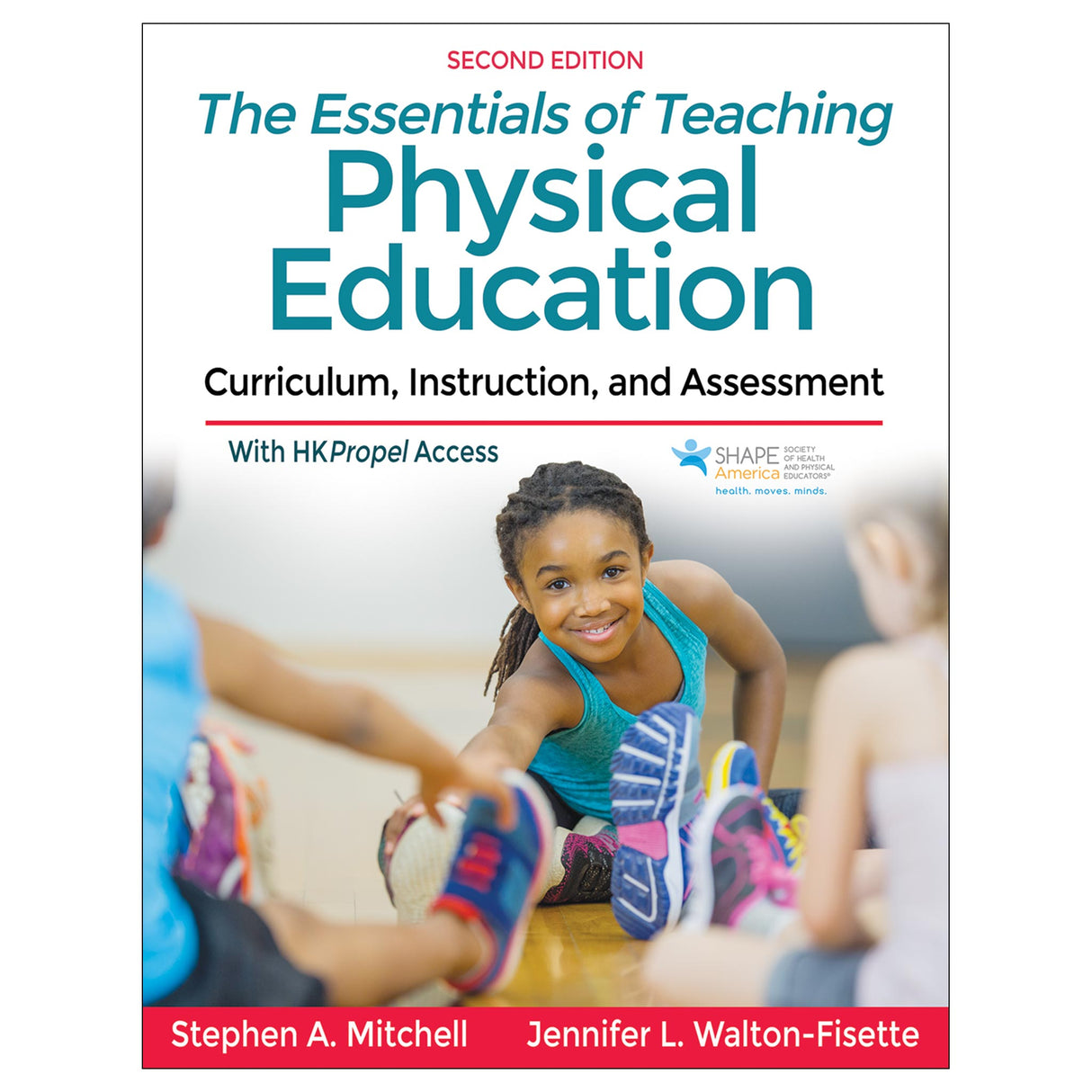The Essentials of Teaching Physical Education 2nd Edition Ebook With HKPropel Access
Curriculum, Instruction, and Assessment
$77.00 USD

In this new edition, future K-12 physical educators will find an accessible and effective approach to delivering vital content to students. The book takes a standards-based approach that is fully integrated with SHAPE America assessments, and its teaching for learning approach to curriculum development takes the guesswork out of translating the text’s information into action.
The Essentials of Teaching Physical Education is fully updated from its successful first edition and is augmented by new material. A new chapter on social-emotional learning and trauma-informed practices helps prepare readers in areas that are crucial in today’s educational landscape. A new special element, Critical Perspective on Teaching and Learning, helps future and current teachers understand the importance of critical analysis and equity issues in all aspects of teaching and learning, including the learning context, the student body, the curriculum, and what and how content is taught. This new edition also features expanded instructor ancillaries.
This comprehensive text covers what future teachers need to know about teaching K-12 physical education, offering a flexible, individualized approach to enhance student learning and acquisition of skills. As readers work their way through the text, they can acquire the following:
- A strong working knowledge of standards and standards-based learning outcomes that will help students achieve those outcomes
- The ability to plan for learning in both the short and long term
- The management and teaching skills they need to ensure an equitable environment that fosters student learning in the psychomotor, cognitive, and affective domains for all students
- The means to assess student learning and program effectiveness
With advice, tips, and success stories from top physical educators, The Essentials of Teaching Physical Education offers readers an inside look at how to motivate students while focusing on what teachers really need to know to succeed. It delivers practical and essential information and guidance on the most relevant topics for today’s physical educators, including physical literacy, accountability, social justice, social-emotional learning, and trauma-informed practices. Everything a physical educator needs to know to succeed is found here, delivered in a straightforward and highly readable manner.
Human Kinetics is proud to publish this book in association with SHAPE America, the national organization that defines excellence for school-based health and physical education professionals across the United States.
Note: A code for accessing HKPropel is included with this ebook.
Audience
Undergraduate text for physical education teaching methods courses. Resource for current teachers and administrators.Chapter 1. Developing Physically Literate Individuals
Promoting Physical Literacy
Academic Links to Physical Literacy
Summary
Chapter 2. Understanding a Teaching for Learning Approach
Curricular Alignment in Physical Education
Instructional Alignment in Physical Education
Summary
Chapter 3. Examining Student Motivation
Establishing a Motivating Environment
Retaining Students’ Motivation
Intrinsic Versus Extrinsic Motivation
Eradicating Amotivation
Summary
Chapter 4. Understanding Social-Emotional Learning and Using Trauma-Informed Practices
Social and Emotional Learning (SEL)
Trauma-Informed Practices (TIPs)
Becoming Self-Aware Through Critical Reflection
Strategies on Fostering Resilient Learners
Summary
Part II. Teaching to the National Standards for K-12 Physical Education
Chapter 5. Standard 1: Developing Motor Skills and Movement Patterns
Competency Versus Proficiency
Motor Skills and Phases of Performance
Elementary School: K-Grade 5
Middle School: Grades 6-8
High School: Grades 9-12
Summary
Chapter 6. Standard 2: Applying Concepts, Principles, Strategies, and Tactics
Elementary School: K-Grade 5
Middle School: Grades 6-8
High School: Grades 9-12
Summary
Chapter 7. Standard 3: Achieving Health-Enhancing Physical Activity and Fitness
Elementary School: K-Grade 5
Middle School: Grades 6-8
High School: Grades 9-12
Summary
Chapter 8. Standard 4: Exhibiting Responsible Personal and Social Behavior
Elementary School: K-Grade 5
Middle School: Grades 6-8
High School: Grades 9-12
Summary
Chapter 9. Standard 5: Recognizing the Value of Physical Activity
Elementary School: K-Grade 5
Middle School: Grades 6-8
High School: Grades 9-12
Summary
Part III. Building the Curriculum
Chapter 10. Unit and Lesson Planning
Unit Planning
Lesson Planning
Summary
Chapter 11. Planning Developmentally Appropriate Content
Types of Knowledge
Standards, Outcomes, and Assessments
Learning Domains
Students’ Prior Knowledge and Experiences
Sequencing of Content and Task Progressions
Modifying Content
Summary
Chapter 12. Curriculum Models as Organizing Frameworks
Skill Theme Approach
Teaching Personal and Social Responsibility
Tactical Games Model
Sport Education Model
Fitness Education
Adventure Education
Outdoor Education
Cultural Studies
Implementing Curriculum Models Within Units of Instruction
Summary
Part IV. Instruction and Assessment
Chapter 13. Establishing and Managing a Safe Learning Environment
Setting Rules for Your Gymnasium
Managing Student Behavior
Maximizing Learning and Activity Time
Managing the Learning Environment During Instruction and Activity
Summary
Chapter 14. Developing Essential Teaching Skills
Exploring Instructional Styles
Employing Effective Teaching Tactics
Summary
Chapter 15. Assessing Student Learning
Purposes of Assessment
Grading Schemes
Selecting Appropriate Assessments
Type of Assessments
Organizing and Interpreting Data
Summary
Part V. Developing as a Professional
Chapter 16. 21st Century Skills in Physical Education
Framework for 21st Century Learning
21st Century Student Outcomes
21st Century Support Systems
Summary
Chapter 17. Advocacy, Professionalism, and Professional Development
Advocating for Your Profession
Professional Development Opportunities
Summary
Critical Perspective on Teaching and Learning
Social and Emotional Learning (SEL)
All ancillaries are free to adopting instructors through HKPropel.
Web resource. Includes supplemental activities for each chapter and key figures from the text.
Test package. Contains more than 200 questions in true-false, fill-in-the-blank, essay and short-answer, and multiple-choice formats.
Presentation package. Features more than 300 PowerPoint slides of text, artwork, and tables from the book that can be used for class discussion and presentation. The slides in the presentation package can be used directly within PowerPoint or printed to make handouts for students. Instructors can easily add, modify, and rearrange the order of the slides.
Instructors also receive access to all student materials in HKPropel; these include online learning activities for each chapter and key figures from the text.
Human Kinetics is pleased to partner with SHAPE America by offering discounts on our resources to SHAPE America members! Whether you’re a preK-12 teacher, higher education faculty member, researcher, administrator, or future professional, we’re here to help you in your professional career and personal fitness journey of improved fitness, stronger athletic performance, and better nutrition.
SHAPE America members receive a 30% discount on this resource and other eligible resources through the member portal at SHAPE America. Learn more about SHAPE America membership at SHAPEAmerica.org or direct your questions about the discount to askmembership@shapeamerica.org.





